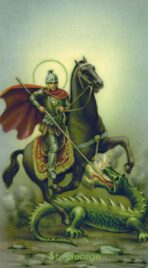Juan de la Encina
FREE Catholic Classes
(JUAN DE LA ENZINA).
Spanish dramatic poet, called by Ticknor the father of the Spanish secular drama ; b. in the village of Encina near Salamanca, 7 Aug., 1468; d. in Salamanca, 1534. He was educated at the University of Salamanca, whence he proceeded to Madrid, where at the age of twenty-five he became a member of the household of Fadrique de Toledo, first Duke of Alba. Later, Encina went to Rome, where he took orders, and owing to his skill in music attracted the attention of Leo X who made him maestro di capella , which was a signal honour. In 1519 he accompanied Fadrique Afan de Ribera, Marquis of Tarifa, on a pilgrimage to the Holy Land, where he remained two years, and upon his return in 1521 he published a poetical account of his travels, rather devoid of literary merit, under the title "Trabagia o Via Sagrada de Hierusalem". At a more advanced age, he was appointed prior of Leon and returned to Spain, where he died. He was buried in the cathedral of that city.
Encina published the first edition of his works under the title of "El Cancionero". This was reprinted five times during the sixteenth century, showing that he enjoyed great popularity. Although he wrote lyrical poems, songs, and villancios in the old Spanish style, his most important works were his dramatic compositions which he himself calls representaciones, and which fill the fourth division of his "Cancionero". They are eleven in number, all in the nature of eclogues, and written in some form of old Spanish verse; in all there is singing, and in one of them a dance. They therefore have several elements of the secular drama, the origin of which, according to Ticknor, can be traced no further back by any existing authentic monument. Two things must be considered, however, in connexion with these compositions as the foundation of the secular drama. One is that they are eclogues in form and name but not in substance ; the second, that they were really acted before an audience. The date of these performances has been given as early as 1492. The representaciones have not much dramatic merit. They are crude and slight, and there is no pretension to a plot. Some of the most important works of Encina are: "The Triumph of Love ", "The Knight who turns Shepherd", and "The Shepherds who turn Courtiers". He was also the author of a prose work on the condition of the poetic art in Spain entitled "Arte de Poesia Castellana", published about 1497.
We ask you, humbly: don't scroll away.
Hi readers, it seems you use Catholic Online a lot; that's great! It's a little awkward to ask, but we need your help. If you have already donated, we sincerely thank you. We're not salespeople, but we depend on donations averaging $14.76 and fewer than 1% of readers give. If you donate just $5.00, the price of your coffee, Catholic Online School could keep thriving. Thank you.Help Now >








 Daily Readings for Tuesday, April 23, 2024
Daily Readings for Tuesday, April 23, 2024 St. George: Saint of the Day for Tuesday, April 23, 2024
St. George: Saint of the Day for Tuesday, April 23, 2024 Prayer After A Surgery: Prayer of the Day for Tuesday, April 23, 2024
Prayer After A Surgery: Prayer of the Day for Tuesday, April 23, 2024


